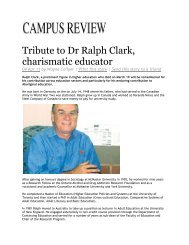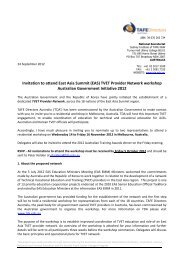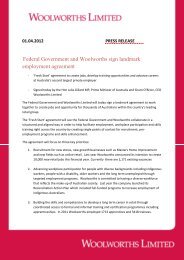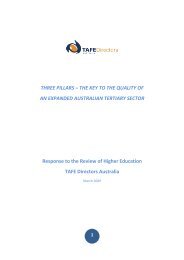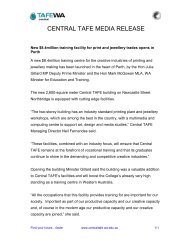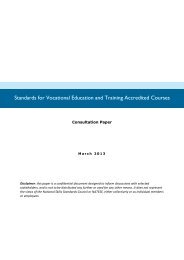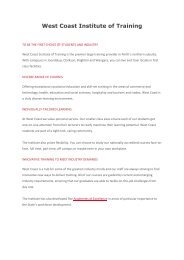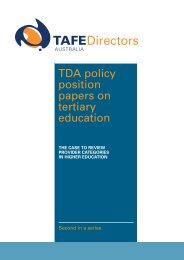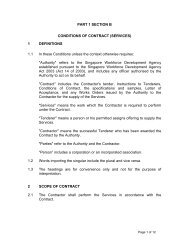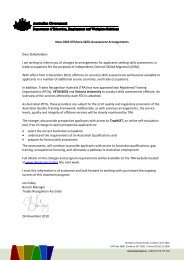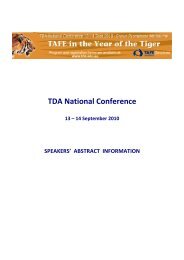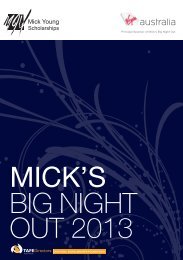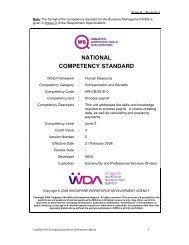Occasional Paper - TAFE Directors Australia
Occasional Paper - TAFE Directors Australia
Occasional Paper - TAFE Directors Australia
You also want an ePaper? Increase the reach of your titles
YUMPU automatically turns print PDFs into web optimized ePapers that Google loves.
38<br />
THE HYBRID TIGER: ONE TERTIARY – A CONNECTED SECTOR<br />
• How would students benefit from a new,<br />
connected ‘tertiary education sector’<br />
• How do universities and <strong>TAFE</strong> institutes best<br />
meet students’ needs<br />
• Would industry and the community be<br />
satisfied<br />
A conversation between Bruce Mackenzie, CEO,<br />
Holmesglen Institute and Professor Greg Craven,<br />
Vice-Chancellor, <strong>Australia</strong>n Catholic University<br />
The following extract is from Andrew Trounson’s<br />
article in The <strong>Australia</strong>n, 15 September 2010:<br />
UNIVERSITIES may complain that<br />
commonwealth funding doesn’t cover<br />
the cost of teaching, but the chairman<br />
of <strong>TAFE</strong> <strong>Directors</strong> <strong>Australia</strong> believes<br />
the funding rate is “pretty reasonable”.<br />
The comments at the <strong>TAFE</strong> <strong>Directors</strong><br />
<strong>Australia</strong> conference in Melbourne<br />
this week highlight the lower cost<br />
structures of <strong>TAFE</strong>s that don’t offer<br />
higher degrees or research.<br />
“You can operate at the HECS level<br />
fairly easily,” said Bruce Mackenzie,<br />
who is also director of Victorian<br />
<strong>TAFE</strong> Holmesglen.<br />
His comments coincide with TDA<br />
lobbying the Gillard government to<br />
compete with universities for access<br />
to commonwealth funded places for<br />
degrees in areas of skills shortage.<br />
But Mr Mackenzie also said the<br />
faster-than-expected expansion<br />
of the university sector ahead<br />
of commonwealth places being<br />
uncapped in 2012 “suggests that<br />
maybe vice-chancellors think the<br />
money isn’t too bad” after all.<br />
The <strong>TAFE</strong> push for commonwealth<br />
places is raising questions about the<br />
importance of the research-teaching<br />
nexus in delivering degrees.<br />
Meanwhile, <strong>Australia</strong>n Catholic<br />
University vice-chancellor Greg<br />
Craven said aggressive expansion at<br />
current funding rates during 2010,<br />
was for many universities a business<br />
decision aimed at capitalising on<br />
growth before the market moved to<br />
a student demand-driven system in<br />
2012, rather than an endorsement of<br />
funding levels.<br />
“The reality is if you are a relatively<br />
small university going into open<br />
competition with a two-year time<br />
lag, you would be crazy to wait for<br />
the bell to ring and all the sharks to<br />
jump in the water and then start to<br />
grow,” said Professor Craven, whose<br />
institution is 25 per cent overenrolled<br />
above the existing cap.<br />
On the question of degrees in<br />
<strong>TAFE</strong>s, Professor Craven said the<br />
appropriateness of it depended on<br />
the course and the capacity of the<br />
organisation.<br />
He noted that while much university<br />
teaching was vocational in nature,<br />
universities also have a wider role<br />
in delivering disciplines that aren’t<br />
specifically vocational, as well as<br />
pursuing research and participating<br />
in public debate.<br />
Professor Craven said some serious<br />
thinking was needed on how<br />
universities and <strong>TAFE</strong>s could cooperate<br />
in a blurred tertiary sector.<br />
. . .



